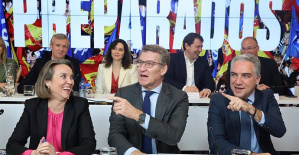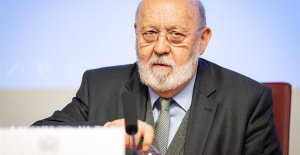The party of former Prime Minister Borissov is the favorite to lead a very fragmented Parliament and in the shadow of abstention
MADRID, 2 Oct. (EUROPA PRESS) -
The jaded Bulgarian population returns to the polls this Sunday for the fourth time in a year and a half after the motion of censure that ended Prime Minister Kiril Petkov's fragile coalition in June in parliamentary elections that will reflect, according to polls, the political fragmentation of the country.
Between seven and eight parties could end up with political representation after the elections this Sunday with the party of Citizens for European Development of Bulgaria, of former Prime Minister Boyko Borissov, in the lead with approximately 25 percent of the votes thanks to the familiarity that arouses in voters in times of crisis, followed by Petkov's party, We Continue the Change, with approximately 20 percent of the ballots.
Third place will be between the Turkish-Muslim Movement for Rights and Freedoms, the Socialists and the far-right pro-Russian Revival party, according to polls that predict, to the surprise of almost no experts, a record abstention, around at 50 percent. The unknown remains to see what happens with the parties of the Bulgarian singer Slavi Trifonov (There is such a town - ITN) and former interim Prime Minister Stefan Yanev (the pro-Russian movement Bulgarian Rise).
Revival, by Kostadin Kostadinov, will be the great beneficiary of the electoral impact of the war in Ukraine. Kostadinov, who has called for "total neutrality" in the conflict, has won the sympathy of voters in recent weeks and could end up doubling the result of the last elections, in which he reached 5 percent of the vote. . This time, he could reach double figures.
If anything, these elections could consolidate the populist movements in Parliament, where up to four formations of this court could obtain representation. For the experts from the LSE European Institute, it is further proof of the ideological incoherence that has dominated Bulgarian politics in recent years, whose parties have been structured between supporting and rejecting Borisov.
Inconsistency, they point out from the institute, which has become even more prominent in recent months due to the war in Ukraine, Gazprom's decision to cut off gas supplies to Bulgaria and the North Macedonia issue, and a growing estrangement major concern of the population, related to inflation that reached 15 percent in August, the rise in prices and the energy crisis that is approaching.
"Bulgaria is entering a downward spiral of elections and this is a phenomenon that has every chance of spreading to other parts of Europe," explains political scientist Teodora Yovcheva to Euronews Bulgaria. "Israel and Spain already have a similar fate. However, in the Bulgarian case, the intensity is much stronger. Therefore, the European political elite has the opportunity to learn from the Bulgarian experience and appreciate the value of interaction. predictable and stable between the parties".

 Exploring Cardano: Inner Workings and Advantages of this Cryptocurrency
Exploring Cardano: Inner Workings and Advantages of this Cryptocurrency Seville.- Economy.- Innova.- STSA inaugurates its new painting and sealing hangar in San Pablo, for 18 million
Seville.- Economy.- Innova.- STSA inaugurates its new painting and sealing hangar in San Pablo, for 18 million Innova.- More than 300 volunteers join the Andalucía Compromiso Digital network in one month to facilitate access to ICT
Innova.- More than 300 volunteers join the Andalucía Compromiso Digital network in one month to facilitate access to ICT Innova.-AMP.- Ayesa acquires 51% of Sadiel, which will create new technological engineering products and expand markets
Innova.-AMP.- Ayesa acquires 51% of Sadiel, which will create new technological engineering products and expand markets The PP sees the concentration of support for Sánchez in Ferraz as a "failure" and believes that it "complicates" the story of its continuity
The PP sees the concentration of support for Sánchez in Ferraz as a "failure" and believes that it "complicates" the story of its continuity Marc Márquez returns to pole in Jerez
Marc Márquez returns to pole in Jerez The CIS carries out a quick survey on Sánchez's letter to measure the reaction of citizens
The CIS carries out a quick survey on Sánchez's letter to measure the reaction of citizens 12M.- Puigdemont to Sánchez and Illa: "This is not about the future of the PSOE! What have you believed?"
12M.- Puigdemont to Sánchez and Illa: "This is not about the future of the PSOE! What have you believed?" How Blockchain in being used to shape the future
How Blockchain in being used to shape the future Not just BTC and ETH: Here Are Some More Interesting Coins Worth Focusing on
Not just BTC and ETH: Here Are Some More Interesting Coins Worth Focusing on UPV students build a prototype of a wooden house to move to Equatorial Guinea
UPV students build a prototype of a wooden house to move to Equatorial Guinea The UA opens the call for the Impulso 2024 Awards for the best innovative business initiatives
The UA opens the call for the Impulso 2024 Awards for the best innovative business initiatives ALI, virtual assistant from Alicante, internationally recognized by the OECD
ALI, virtual assistant from Alicante, internationally recognized by the OECD Retrópolis brings the golden age of video games and computing to the UPV
Retrópolis brings the golden age of video games and computing to the UPV A million people demonstrate in France against Macron's pension reform
A million people demonstrate in France against Macron's pension reform Russia launches several missiles against "critical infrastructure" in the city of Zaporizhia
Russia launches several missiles against "critical infrastructure" in the city of Zaporizhia A "procession" remembers the dead of the Calabria shipwreck as bodies continue to wash up on the shore
A "procession" remembers the dead of the Calabria shipwreck as bodies continue to wash up on the shore Prison sentences handed down for three prominent Hong Kong pro-democracy activists
Prison sentences handed down for three prominent Hong Kong pro-democracy activists ETH continues to leave trading platforms, Ethereum balance on exchanges lowest in 3 years
ETH continues to leave trading platforms, Ethereum balance on exchanges lowest in 3 years Investors invest $450 million in Consensys, Ethereum incubator now valued at $7 billion
Investors invest $450 million in Consensys, Ethereum incubator now valued at $7 billion Alchemy Integrates Ethereum L2 Product Starknet to Enhance Web3 Scalability at a Price 100x Lower Than L1 Fees
Alchemy Integrates Ethereum L2 Product Starknet to Enhance Web3 Scalability at a Price 100x Lower Than L1 Fees Mining Report: Bitcoin's Electricity Consumption Declines by 25% in Q1 2022
Mining Report: Bitcoin's Electricity Consumption Declines by 25% in Q1 2022 Oil-to-Bitcoin Mining Firm Crusoe Energy Systems Raised $505 Million
Oil-to-Bitcoin Mining Firm Crusoe Energy Systems Raised $505 Million Microbt reveals the latest Bitcoin mining rigs -- Machines produce up to 126 TH/s with custom 5nm chip design
Microbt reveals the latest Bitcoin mining rigs -- Machines produce up to 126 TH/s with custom 5nm chip design Bitcoin's Mining Difficulty Hits a Lifetime High, With More Than 90% of BTC Supply Issued
Bitcoin's Mining Difficulty Hits a Lifetime High, With More Than 90% of BTC Supply Issued The Biggest Movers are Near, EOS, and RUNE during Friday's Selloff
The Biggest Movers are Near, EOS, and RUNE during Friday's Selloff Global Markets Spooked by a Hawkish Fed and Covid, Stocks and Crypto Gain After Musk Buys Twitter
Global Markets Spooked by a Hawkish Fed and Covid, Stocks and Crypto Gain After Musk Buys Twitter Bitso to offset carbon emissions from the Trading Platform's ERC20, ETH, and BTC Transactions
Bitso to offset carbon emissions from the Trading Platform's ERC20, ETH, and BTC Transactions Draftkings Announces 2022 College Hoops NFT Selection for March Madness
Draftkings Announces 2022 College Hoops NFT Selection for March Madness



























